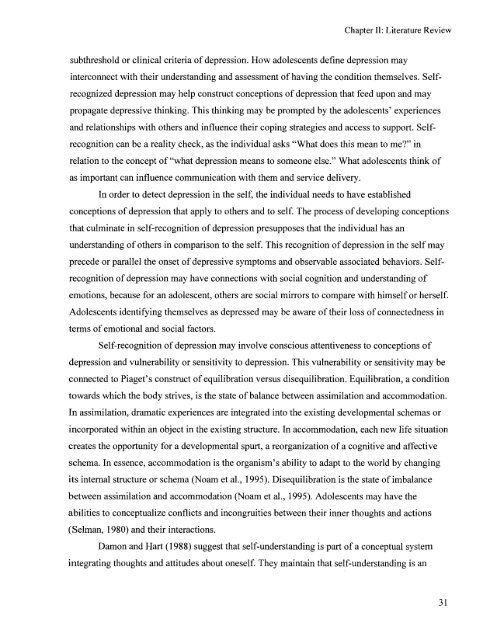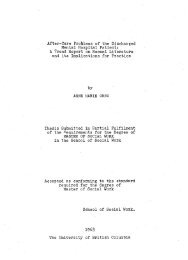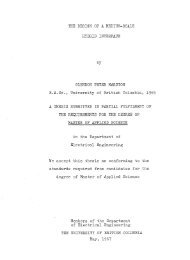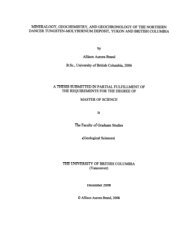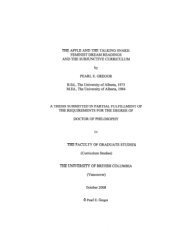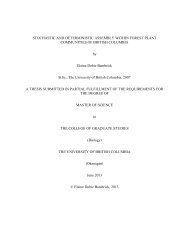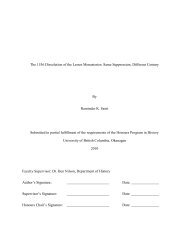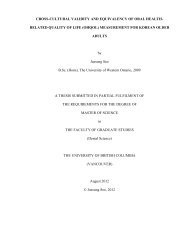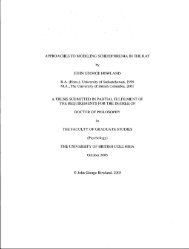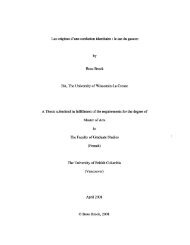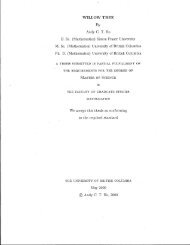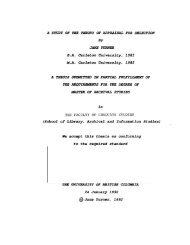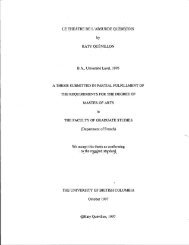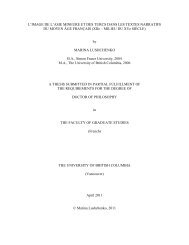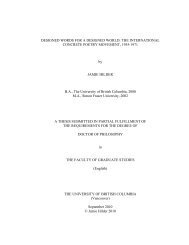how do adolescents define depression? - cIRcle - University of ...
how do adolescents define depression? - cIRcle - University of ...
how do adolescents define depression? - cIRcle - University of ...
You also want an ePaper? Increase the reach of your titles
YUMPU automatically turns print PDFs into web optimized ePapers that Google loves.
Chapter II: Literature Review<br />
subthreshold or clinical criteria <strong>of</strong> <strong>depression</strong>. How a<strong>do</strong>lescents <strong>define</strong> <strong>depression</strong> may<br />
interconnect with their understanding and assessment <strong>of</strong> having the condition themselves. Self-<br />
recognized <strong>depression</strong> may help construct conceptions <strong>of</strong> <strong>depression</strong> that feed upon and may<br />
propagate depressive thinking. This thinking may be prompted by the a<strong>do</strong>lescents' experiences<br />
and relationships with others and influence their coping strategies and access to support. Self-<br />
recognition can be a reality check, as the individual asks "What <strong>do</strong>es this mean to me?" in<br />
relation to the concept <strong>of</strong> "what <strong>depression</strong> means to someone else." What a<strong>do</strong>lescents think <strong>of</strong><br />
as important can influence communication with them and service delivery.<br />
In order to detect <strong>depression</strong> in the self, the individual needs to have established<br />
conceptions <strong>of</strong> <strong>depression</strong> that apply to others and to self. The process <strong>of</strong> developing conceptions<br />
that culminate in self-recognition <strong>of</strong> <strong>depression</strong> presupposes that the individual has an<br />
understanding <strong>of</strong> others in comparison to the self This recognition <strong>of</strong> <strong>depression</strong> in the self may<br />
precede or parallel the onset <strong>of</strong> depressive symptoms and observable associated behaviors. Self-<br />
recognition <strong>of</strong> <strong>depression</strong> may have connections with social cognition and understanding <strong>of</strong><br />
emotions, because for an a<strong>do</strong>lescent, others are social mirrors to compare with himself or herself<br />
A<strong>do</strong>lescents identifying themselves as depressed may be aware <strong>of</strong> their loss <strong>of</strong> connectedness in<br />
terms <strong>of</strong> emotional and social factors.<br />
Self-recognition <strong>of</strong> <strong>depression</strong> may involve conscious attentiveness to conceptions <strong>of</strong><br />
<strong>depression</strong> and vulnerability or sensitivity to <strong>depression</strong>. This vulnerability or sensitivity may be<br />
connected to Piaget's construct <strong>of</strong> equilibration versus disequilibration. Equilibration, a condition<br />
towards which the body strives, is the state <strong>of</strong> balance between assimilation and accommodation.<br />
In assimilation, dramatic experiences are integrated into the existing developmental schemas or<br />
incorporated within an object in the existing structure. In accommodation, each new life situation<br />
creates the opportunity for a developmental spurt, a reorganization <strong>of</strong> a cognitive and affective<br />
schema. In essence, accommodation is the organism's ability to adapt to the world by changing<br />
its internal structure or schema (Noam et al., 1995). Disequilibration is the state <strong>of</strong> imbalance<br />
between assimilation and accommodation (Noam et al., 1995). A<strong>do</strong>lescents may have the<br />
abilities to conceptualize conflicts and incongruities between their inner thoughts and actions<br />
(Selman, 1980) and their interactions.<br />
Damon and Hart (1988) suggest that self-understanding is part <strong>of</strong> a conceptual system<br />
integrating thoughts and attitudes about oneself They maintain that self-understanding is an<br />
31


